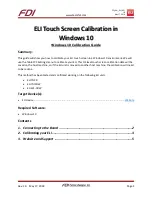
IPPC-7157 User Manual
42
First/Second/Third/Other Boot Device
The BIOS attempts to load the operating system from the devices in the
sequence selected in these items. The choices: Floppy; LS/ZIP; HDD;
SCSI; CDROM; Disabled.
Swap Floppy Drive
When enabled, floppy drives A and B will be exchanging without any
physical connection and modification on the cables.
Boot Up Floppy Seek
When enabled, the BIOS tests (seeks) floppy drives to determine whether
they have 40 or 80 tracks. Only 360-KB floppy drives have 40 tracks;
drives with 270KB, 1.2MB, and 1.44MB capacity all have 80 tracks.
Because very few modern PCs have 40-track floppy drives, we recom-
mend that you set this field to disabled to save time.
Boot Up NumLock Status
Toggle between On or Off to control the state of the NumLock key when
the system boots. If On, the numeric keypad is in numeric mode. If off,
the numeric keypad is in cursor control mode.
Gate A20 Option
Gate A20 refers to the way the system addresses memory above 1 MB
(extended memory). When set to Fast, the system chipset controls Gate
A20. When set to Normal, a pin in the keyboard controller controls Gate
A20. Setting Gate A20 to Fast improves system speed, particularly with
OS/2 and Windows.
Typematic Rate Setting
When Disabled, the following two items (Typematic Rate and Typematic
Delay) are irrelevant. Keystroke repeats at a rate determined by the key-
board controller in your system. When Enabled, you can select a type-
matic rate and typematic delay.
Summary of Contents for IPPC-7157 Series
Page 14: ...IPPC 7157 User Manual 6...
Page 17: ...9 Chapter2 Figure 2 1 OverviewView Figure 2 2 Side View...
Page 24: ...IPPC 7157 User Manual 16...
Page 32: ...IPPC 7157 User Manual 24...
Page 42: ...IPPC 7157 User Manual 34...
Page 70: ...IPPC 7157 User Manual 62...
Page 71: ...Appendix A LCD Specifications and Selection Settings...
Page 73: ...Appendix B Pin Assignments...
Page 80: ...IPPC 7157 User Manual 72...
Page 81: ...Appendix C Keyboard Translator...
















































